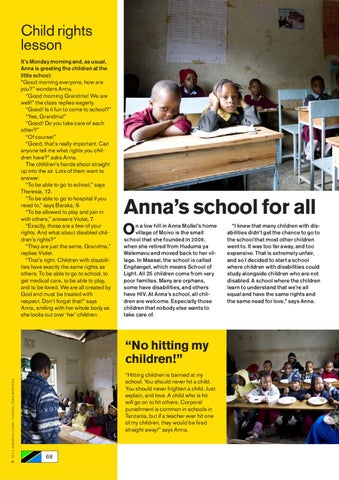Child rights lesson It’s Monday morning and, as usual, Anna is greeting the children at the little school: “Good morning everyone, how are you?” wonders Anna. “Good morning Grandma! We are well!” the class replies eagerly. “Good! Is it fun to come to school?” “Yes, Grandma!” “Good! Do you take care of each other?” “Of course!” “Good, that’s really important. Can anyone tell me what rights you children have?” asks Anna. The children’s hands shoot straight up into the air. Lots of them want to answer. “To be able to go to school,” says Theresia, 12. “To be able to go to hospital if you need to,” says Baraka, 9. “To be allowed to play and join in with others,” answers Violet, 7. “Exactly, those are a few of your rights. And what about disabled children’s rights?” “They are just the same, Grandma,” replies Violet. “That’s right. Children with disabilities have exactly the same rights as others. To be able to go to school, to get medical care, to be able to play, and to be loved. We are all created by God and must be treated with respect. Don’t forget that!” says Anna, smiling with her whole body as she looks out over ‘her’ children.
Anna’s school for all
O
n a low hill in Anna Mollel’s home village of Moivo is the small school that she founded in 2009, when she retired from Huduma ya Walemavu and moved back to her village. In Maasai, the school is called Engilanget, which means School of Light. All 25 children come from very poor families. Many are orphans, some have disabilities, and others have HIV. At Anna’s school, all children are welcome. Especially those children that nobody else wants to take care of.
TE X T: ANDRE AS LÖNN PHOTOS: TOR A MÅRTENS
“No hitting my children!” “Hitting children is banned at my school. You should never hit a child. You should never frighten a child. Just explain, and love. A child who is hit will go on to hit others. Corporal punishment is common in schools in Tanzania, but if a teacher ever hit one of my children, they would be fired straight away!” says Anna.
68
“I knew that many children with disabilities didn’t get the chance to go to the school that most other children went to. It was too far away, and too expensive. That is extremely unfair, and so I decided to start a school where children with disabilities could study alongside children who are not disabled. A school where the children learn to understand that we’re all equal and have the same rights and the same need for love,” says Anna.
